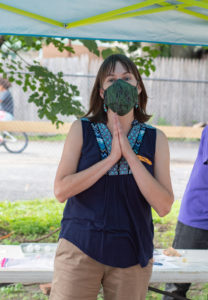People
Abby Kinchy
Abby Kinchy is a sociologist whose research and teaching focus on environmental challenges and the relationship between science and democracy. She lives in Troy, NY, where she is a professor in the Department of Science and Technology Studies at Rensselaer Polytechnic Institute. Kinchy has written two books that explore how ordinary people use “citizen science” to examine environmental problems and advocate for solutions. Science by the People: Participation, Power, and the Politics of Environmental Knowledge, co-authored with Aya Kimura, compares case studies in the United States, Japan, Mexico, and other parts of the world, where citizen scientists have investigated the impacts of shale oil and gas, nuclear power, and genetically engineered crops. Seeds, Science, and Struggle: The Global Politics of Transgenic Crops focuses on farmers and activists in Mexico and Canada who organized in defense of traditional seed-saving practices and alternatives to industrialized agriculture. Kinchy also led the Watershed Knowledge Mapping Project, a study of volunteer watershed monitoring projects in Pennsylvania and New York, where concerned citizens aimed to use water quality data to protect their streams from the impact of natural gas development.
Email: kincha@rpi.edu
Sebastián Ureta
Sociologist Sebastian Ureta, an associate professor at Universidad Alberto Hurtado in Santiago, Chile, has been studying the problem of soil contamination resulting from mining in Chile since 2013. Through the Nuestros Suelos project, he is working with environmental organizations and engineers to develop a sequence of community meetings, participatory soil contamination assessment exercises, and workshops to assess the risks of exposure to soil contaminants and evaluate the possibilities for political and collective action surrounding Chile’s mining industry. In 2022 the University of California Press will publish his new book, coauthored with Patricio Flores, Worlds of Gray and Green: Mineral extraction as ecological practice.
Mónica Ramírez-Andreotta
Mónica Ramírez-Andreotta has extensive experience with conducting bilingual (English and Spanish) community-based soil research, and in this project will focus on developing and validating field kits for testing soil for lead and arsenic. Her related efforts include initiatives funded by the National Institute of Environmental Health Sciences and NSF. Gardenroots partners with community members who live near resource extraction activities or toxic release inventory sites and are concerned about their exposure to contaminants of concern. By working together to determine water, soil, dust, and/or plant contaminant concentrations, Gardenroots helps sustain gardens efforts while reducing chemical exposures. Community members are trained to collect environmental samples which are then tested in a laboratory. Gardenroots follows a community-first reporting model and communicates the results of their studies to all participating families and individuals, and more broadly to influence environmental decision making. Gardenroots builds on individual- and community-level resiliencies and combats environmental vulnerabilities, helping to ensure pollution does not interfere with local efforts. The University of Arizona’s (UA) Project Harvest in partnership with the Sonora Environmental Research Institute, Inc., aims to monitor and evaluate the use of harvested rainwater at homes and community gardens in selected urban and rural communities. Project Harvest trains citizen scientists who work alongside a team of promotoras (community health workers) and UA scientists to determine potential microbial, organic and inorganic contaminants in harvested rainwater as well as soil and fresh produce grown in home, school, and/or community gardens irrigated by harvested rainwater. The results inform the broader community and recommendations for safe harvested rainwater use in gardens. Project Harvest is implementing a two-prong environmental monitoring approach that includes low cost, on-site, tools providing semi-rapid in-home results and a traditional sample collection protocol with measurements conducted in laboratories.
Salvatore Engel-Di Mauro
Salvatore Engel-Di Mauro is professor and head at the Geography Department of SUNY New Paltz and chief editor for Capitalism Nature Socialism. His most recent books are Socialist States and Environment (Pluto) and Urban Food Production for Ecosocialism (Routledge), with George Martin. His research areas include soil contamination and acidification, urban food production, and socialism and environment. He is currently involved in two other complementary research projects: (1) a collaborative study of trace element and organic pollutant contamination in urban community gardens in Brooklyn (NY) and Seattle (WA); and (2) an NSF-funded investigation of the role of atmospheric deposition in trace element contamination in urban community gardens in Kingston, NY.
Kathy High
Kathy High, a professor of Arts at Rensselaer and an interdisciplinary artist working with technology, art and science, will work with the research team to create media and tangible artifacts to facilitate new kinds of interactions with and reflections about soil. High regularly collaborates with scientists, and her work considers living systems and the social, political and ethical dilemmas of biotechnology and surrounding industries. High is the Coordinator of NATURE Lab (North Troy Art, Technology and Urban Research in Ecology), a volunteer-run project founded in 2013, which aims to connect artists, scientists, and neighborhood residents around urban ecological issues and environmental justice.
Dan Walls
Dan Walls is a postdoctoral researcher in the Department of Science and Technology Studies at Rensselaer Polytechnic Institute. His graduate studies and a prior postdoctoral position focused on fluid mechanics and transport phenomena, most recently in the context of the remediation of crude oils spilled into aquatic environments. His prior research has required him to both operate specialized laboratory equipment as well as construct experimental apparatuses for making scientific measurements. Through this project, he will utilize skills from his previous training as well as contribute to the broader socio-technical analysis of heavy metal contamination of soil.
